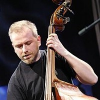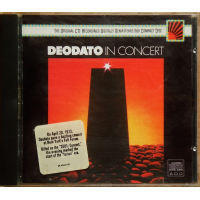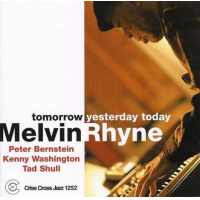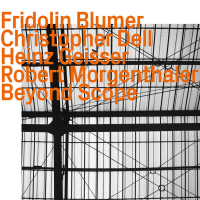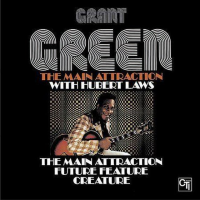Home » Jazz Articles » Liner Notes » Klaus Kugel: Op Der Schlemz Live Nemu
Klaus Kugel: Op Der Schlemz Live Nemu
Discovering what "anything" will prove to be is a motive for improvised music's players and listeners alike, but anything is most likely to mean something when practiced hands take us on the voyage of discovery and "something" is what we want to hear again and again. What's meaningful in Op Der Schlemze Live are the art and depth of detailed sonic moments that stir our imaginations, evoke our responses and please our ears. These developments result from the four musicians' distinct sensibilities, sensitivities and combined quick wits in spontaneous interaction.
Op Der Schlemz Live means "at the foundry," the Luxembourg venue where this foursome of distantly based but nonetheless united improvisers concertized in 2010. Kugel, who serves as organizer though not leader of the ensemble, lives in Koln; Piket is a New Yorker; Glod was based in Strasbourg but has moved to Luxenbourg, and Tokar lives in Ukraine. They have been connected for four years. Kugel and Glod go back further—to 2002; Kugel first met Piket and Tokar, separately, in 2007 or '08. Genuinely a band, not a pickup group, they work together as often as possible, when necessary in smaller combinations. Throughout this program they generate flow by taking risks but also securing each others' moves. With every new foray, no matter how far out they've gone, the collective arrives at gratifying resolution.
The six tracks range from just under six to just over 18 minutes in length. Each sprouts from "heads, very simple things we fill out, not tunes," Kugel says, "which insures they will always sound different. I do not feel like a 'free' player in this combination" he continues, mentioning that his work in the Ganelin Trio is different, "because there are so many natural music rules we go by, even when we're not trying to. All of our pieces fall into metrical time, for instance. I have a lot of freedom, but I'm not playing 'free.' We're just playing." Isn't that proof itself of freedom?
Among the first surprises presented here is Roberta Piket's discursive approach, rather more searching than the progressive yet structured projects she's been known for since debuting on record with Lionel Hampton, Wallace Roney, Ron Carter and Roy Haynes on For the Love of Music in 1995. Roberta's touch opening this live performance with "Dredger of Pig Rolls" has a probing moodiness that seems to belie the gross associations of the title, which was provided by Roby. When the alto saxophonist enters, Roberta and Roby demonstrate an unforced intimacy just by how they draw the melody line; Mark and Klaus slip in unobtrusively, and within a minute the quartet has established its cohesive sound. The bassist, of course, provides counterpoint; the drummer, naturally, constructs a propulsive foundation that courses steadily but unpredictably, like water running over pebbles. After Roby's expansion on the theme, Roberta has another turn, sustaining the dark but not dire atmosphere, then Mark and Klaus take the spotlight, unaccompanied. All actors and their ensemble's tone have been introduced.
"Lviv," named for the city where Mark Tokar was born, starts as a piano-soprano sax duet of aching beauty. Founded in the 1200s and regarded as the cultural capitol of the region long known as Galicia, now split between Poland and Ukraine, Lviv is painted in this musical account as a survivor of sometimes devastating history, ancient and proud. Mark's bass solo is a native son's pledge of allegiance, which Klaus respects with spare accents, as little else need be said.
Klaus explains that "Budmo Hay!" is a Ukraine toast, equivalent to "Cheers!" but this is not your common drinking song. It starts as a soprano-drums feature, with Roby's command of his horn impressive and distinctive: He does not sound like Bechet, Coltrane, Lacy or anyone but himself. Roberta, entering five minutes into the piece, is equally distinctive, building from a few halting single notes to a complete, complicated statement, which Klaus matches loosely, using increasingly pronounced cymbal taps and press rolls. Mark remains with them up to an unexpected stop-time, then dips as low possible, reclaiming the middle with double stops, ending in a nervy arco episode. "Nazar" sustains the set's lyrical, reflective ambiance, Roby now on alto, Klaus using brushes, Mark and Roberta offering responses that deepen the experience. "Our music is very intuitive," says Roberta, "it is really completely about intuition and listening. The more you play this kind of music, the better your skills at that develop. You're not playing over chord changes, where you can play your licks. You have to develop a sense of trust in your self, to grow the patience where you can wait until the right moment when you really have something to add. Over time playing together, we've gained a certain rapport."
That rapport is most impressively showcased in the title track, "Op der Schmelz," in which the four musicians work most subtly for going on 20 uninterrupted minutes, at first tapping unconventional aspects of their instruments. A bowed tone here, the pluck of muffled piano wires there, and is Klaus using a bow on the edge of his cymbal while Roby fingers his sax without blowing through it? The hush is enveloping, then the musicians work at it, energies intense but suppressed, to grow a one-time-only unfolding experience with a seemingly organic narrative arc.
"What I'm most interested in the depth of our music, not its form," Klaus says of this almost completely improvised effort. "Of course we play in a form, otherwise it would not be music. But form demands we bring colors we can use. Of course we use our favorite colors, what we have absorbed lately, who we are, from where we've come. And our forms are set up to get us, together, to a deeper place." This track climaxes in Kugel's limbs-independent solo, and a conclusion that's been pre-determined but, as expressed almost like an afterthought, hardly seems so. "Still Alive," the program's finale, is derived from Ukraine's national anthem, asserting what is obvious to anyone who's immersed themselves in the proceedings.
The goal of artists such as Kugel, Piket, Glod and Tokar, who perform spontaneously, is to conjure fleeting beauty that would be impossible to capture by putting notes on paper, then following along. These musicians trust in themselves and their present impulses, instead of repeatable preconditions. Through the recording process, they invite the world—us to listen, expecting that we listeners will bring our own immediate responses and circumstances to the experience.
So by paying attention to the music of Glod/Piket/Tokar/Kugel you are joining the group. Congratulations! You, too, are now Op Der Schmelz Live.
Liner Notes copyright © 2026 Howard Mandel.
Op Der Schmelz Live can be purchased here.
Contact Howard Mandel at All About Jazz.
Howard is a Chicago-born writer, editor, author, arts reporter for National Public Radio, consultant and videographer. Visit Howard at howardmandel.com.
Track Listing
Dredger of Pig Rolls; Lviv; Budmo, Hay!; Nazar; Op der Schmelz; Still Alive.
Personnel
Additional Instrumentation
Roby Glod: sax contralto e soprano; Roberta Piket: pianoforte; Mark Tokar: contrabbasso; Klaus Kugel: batteria.
Album information
Title: Op Der Schmelz Live | Year Released: 2013 | Record Label: NEMU Records
Tags
PREVIOUS / NEXT
Support All About Jazz
 All About Jazz has been a pillar of jazz since 1995, championing it as an art form and, more importantly, supporting the musicians who make it. Our enduring commitment has made "AAJ" one of the most culturally important websites of its kind, read by hundreds of thousands of fans, musicians and industry figures every month.
All About Jazz has been a pillar of jazz since 1995, championing it as an art form and, more importantly, supporting the musicians who make it. Our enduring commitment has made "AAJ" one of the most culturally important websites of its kind, read by hundreds of thousands of fans, musicians and industry figures every month.



